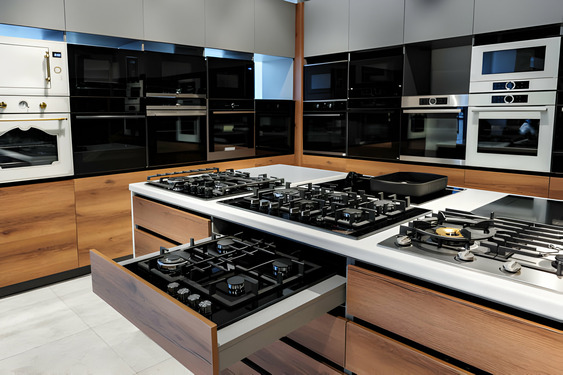
In the bustling world of commercial kitchens, appliances are the unsung heroes that keep the culinary symphony in harmony. From stovetops to refrigerators, these workhorses endure a daily onslaught of grease, heat, and spills. This comprehensive guide unravels the secrets to ensuring the longevity and efficiency of your commercial appliances through effective cleaning and maintenance practices. As we delve into the details, we’ll explore the nuances of appliance care, empowering restaurant owners, kitchen managers, and staff with the knowledge needed to preserve the lifespan and performance of these essential tools. Because in the realm of commercial kitchens, a well-maintained appliance is not just a tool—it’s the key to a seamless culinary experience.
Commercial appliances are the backbone of any kitchen, tirelessly working to bring culinary creations to life. Yet, they often bear the brunt of heavy usage, leading to wear and tear that can compromise their efficiency over time. This guide is a journey through the art of caring for these culinary companions, from understanding the intricacies of different appliances to adopting practical cleaning and maintenance habits. As we unravel the layers of appliance longevity, let’s embark on a mission to not just preserve but enhance the efficiency of our kitchen arsenal.
See also our post on 10 Benefits of Using a Cleaning App for Home Maintenance
The Importance of Cleaning and Maintenance
Prevention of Wear and Tear
Regular cleaning and maintenance prevent the gradual wear and tear that appliances endure during daily use. This proactive approach addresses issues before they escalate, ensuring the longevity of the equipment.
Ensuring Hygiene and Food Safety
Clean appliances contribute to a hygienic kitchen environment, preventing the buildup of bacteria and contaminants. This is critical for ensuring food safety and upholding health standards in a commercial kitchen.
Consistent Performance
Well-maintained appliances operate at their optimal level, delivering consistent performance. This not only enhances the quality of food produced but also contributes to the efficiency and speed of kitchen operations.
Cost-Efficiency
Regular maintenance and cleaning reduce the need for frequent repairs and replacements. This cost-effective approach ensures that commercial kitchens can allocate resources efficiently, minimizing unforeseen expenses.
Compliance with Regulations
Adhering to cleaning and maintenance practices is often a requirement for regulatory compliance. Meeting these standards not only avoids legal issues but also reflects a commitment to maintaining high hygiene and safety standards.
Cleaning Principles for Commercial Appliances
Daily Surface Cleaning
Implement a routine of daily surface cleaning for appliances. Wipe down stovetops, countertops, and other surfaces with a mild cleaning solution to remove grease, spills, and food residue.
Deep Cleaning Schedules
Establish regular deep cleaning schedules for different appliances. This involves disassembling components, such as oven racks or refrigerator shelves, for thorough cleaning to eliminate hidden grime and buildup.
Use of Non-Abrasive Cleaners
Choose non-abrasive cleaners to prevent damage to appliance surfaces. Harsh chemicals or abrasive cleaning tools can scratch or deteriorate the finish of appliances over time.
Focus on High-Touch Areas
Pay special attention to high-touch areas, such as handles and control panels. These areas often accumulate grime and bacteria and require frequent cleaning to maintain hygiene.
Cleaning Agents Compatibility
Ensure that cleaning agents used are compatible with the materials of the appliances. This prevents corrosive reactions that can compromise the integrity of surfaces.
Maintenance Practices for Longevity
Regular Inspections
Conduct regular inspections of appliances to identify any signs of wear, loose parts, or potential issues. Prompt identification allows for proactive maintenance before problems escalate.
Lubrication of Moving Parts
For appliances with moving parts, such as blenders or slicers, regular lubrication is essential. This minimizes friction, reduces wear on components, and ensures smooth operation.
Calibration of Temperature Controls
Regularly calibrate temperature controls on appliances like ovens and refrigerators. This ensures accurate temperature settings, preserving food quality and preventing energy inefficiencies.
Replacement of Worn Seals and Gaskets
Worn seals and gaskets compromise the efficiency of appliances like refrigerators. Regularly inspect and replace these components to maintain optimal temperature levels and energy efficiency.
Clearing Ventilation and Cooling Systems
Ensure that ventilation and cooling systems, such as exhaust fans and condenser coils, are free from debris. Clearing these systems allows appliances to operate efficiently and prevents overheating.
See also our post on The Secrets to Cleaning and Maintaining Stainless Steel Appliances
Appliance-Specific Care
Stovetops and Ovens
Regularly clean stovetops and ovens to prevent the buildup of grease and food residue. For gas stovetops, ensure that burners and igniters are free from debris to maintain proper ignition.
Refrigerators and Freezers
Clean and organize refrigerators and freezers regularly. Check and adjust temperature settings, defrost when necessary, and inspect door seals to prevent energy wastage.
Dishwashers
Clean dishwasher filters and spray arms to ensure proper water circulation. Regularly check for clogs in drainage systems and remove any food particles to prevent odors and inefficiencies.
Grills and Griddles
Clean grill grates and griddles after each use to prevent the buildup of carbonized residue. Regularly inspect and clean burner elements for even heat distribution.
Coffee Machines
Descale coffee machines regularly to prevent mineral buildup in the brewing system. Clean coffee dispensers and drip trays to maintain the quality and taste of brewed coffee.
Environmental Considerations in Cleaning
Eco-Friendly Cleaning Products
Opt for eco-friendly cleaning products to reduce the environmental impact of cleaning practices. These products are biodegradable and pose fewer risks to ecosystems.
Water Conservation
Practice water conservation during cleaning by using spray bottles or damp cloths instead of excessive water. This reduces water wastage while effectively cleaning appliance surfaces.
Recycling of Cleaning Materials
Dispose of cleaning materials responsibly by separating recyclables from non-recyclables. Recycling contributes to sustainable waste management practices in commercial kitchens.
Energy-Efficient Appliances
Consider investing in energy-efficient appliances that require less power for operation. These appliances contribute to lower utility bills and a reduced overall environmental footprint.
Sustainable Maintenance Practices
Adopt sustainable maintenance practices, such as reusing lubrication containers or choosing repair over replacement when feasible. This minimizes the environmental impact of maintaining appliances.
Staff Training and Communication
Training Programs
Implement comprehensive training programs for kitchen staff on proper cleaning and maintenance practices. Equip them with the knowledge and skills needed to care for specific appliances.
Communication of Best Practices
Establish clear communication channels for sharing best practices in appliance care. Regular reminders and updates ensure that staff remains informed and aligned with cleaning protocols.
Reporting of Issues
Encourage staff to promptly report any issues or abnormalities observed in appliances. This fosters a proactive approach to maintenance and allows for timely intervention to address problems.
Recognition and Rewards
Implement recognition and rewards programs for staff who consistently adhere to cleaning and maintenance best practices. This promotes a culture of responsibility and pride in maintaining kitchen equipment.
Continuous Education
Provide continuous education opportunities for staff regarding new appliances or updated cleaning techniques. Keeping staff informed ensures that they remain proficient in appliance care.
Long-Term Planning and Upgrades
Appliance Lifecycle Assessment
Conduct regular assessments of the lifecycle of appliances. This involves evaluating their age, performance, and repair history to determine when upgrades or replacements may be necessary.
See also our post on How to Keep Your Refrigerator Clean and Efficient: Food Safety Matters
Budgeting for Upgrades
Incorporate appliance upgrades into long-term budget planning. This allows commercial kitchens to allocate funds strategically and avoid sudden financial strains associated with unexpected replacements.
Energy Efficiency Considerations
When planning upgrades, prioritize energy-efficient appliances. These not only contribute to lower operating costs but also align with sustainable practices and environmental responsibility.
Vendor Relationships
Maintain strong relationships with appliance vendors. Regular communication ensures access to the latest maintenance tips, upgrades, and efficient customer support for troubleshooting.
Technological Advancements
Stay informed about technological advancements in commercial appliances. Upgrading to newer models with enhanced features can improve efficiency, reduce energy consumption, and enhance overall kitchen operations.
Conclusion
Ensuring the longevity and efficiency of commercial appliances is more than just a chore; it is a dedication to the center of the kitchen, where stovetops, refrigerators, and other appliances create culinary magic. By knowing the fundamentals of efficient cleaning and maintenance, we set out on a mission to protect not just the functionality but the spirit of our kitchen equipment. This manual acts as a road map, assisting managers, employees, and owners of kitchens as they navigate the complex dance of appliance care. By adopting these practices, let us enhance the efficiency and freshness of every dish that graces our kitchen tables.







